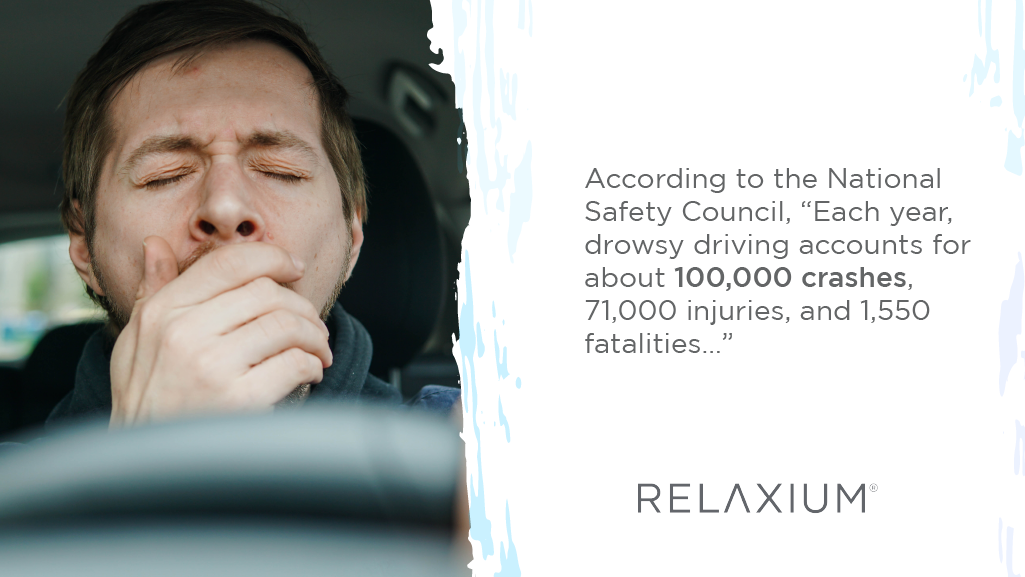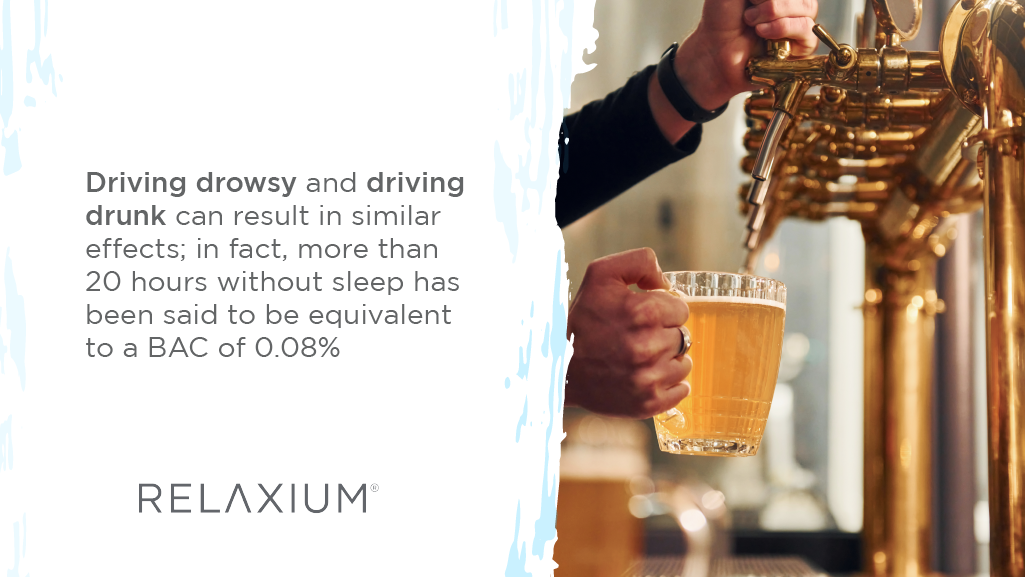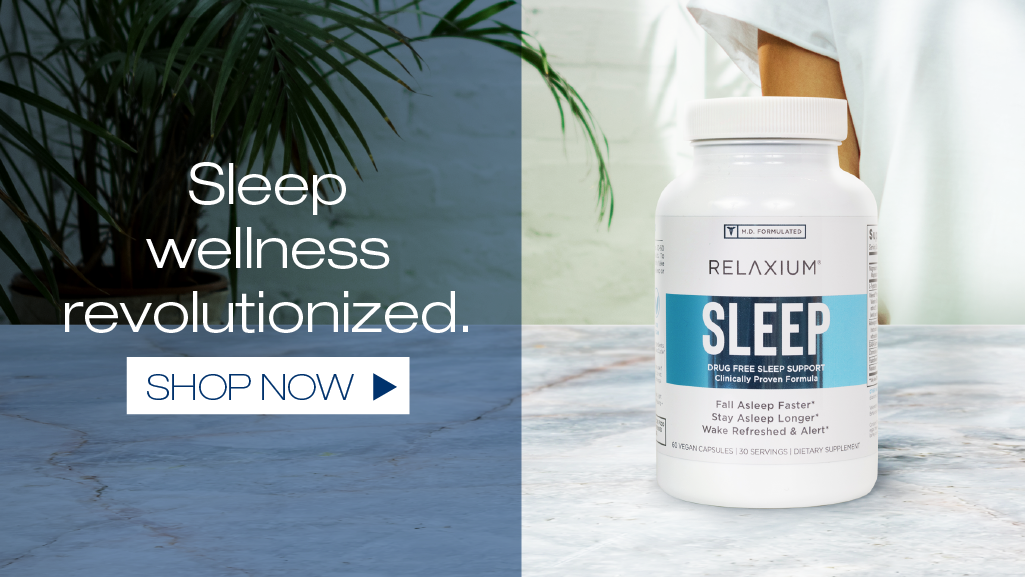Protect yourself and others on the road by understanding the hazards of drowsy driving.
It is unfortunate, but driving drowsy occurs more often than you may think. Maybe you have even done it yourself. Millions already struggle to get enough sleep each night so the next day when it comes time to go to work, school, or simply follow a consistent commute, drowsy driving occurs.
Some may think it’s no big deal because it happens so often; what people don’t realize is how dangerous it truly is to drive drowsy. According to the National Safety Council, “Each year, drowsy driving accounts for about 100,000 crashes, 71,000 injuries, and 1,550 fatalities…”
Why is drowsy driving so common?
There are many reasons that drowsy driving happens. These include:
- High-stress lifestyles: Certain lifestyles can include a large number of responsibilities. These responsibilities can take up time which leaves less room for relaxation and sleep.
- Sleep deprivation: Backing high-stress lifestyles, long work hours and irregular schedules can lead to sleep deprivation which makes drowsy driving more common.
- Underestimation of warning signs: Because so many people already struggle to get sleep, feelings of fatigue and drowsiness can be ignored.
- Long commutes: Traveling long distances early in the morning can increase drowsy driving. Especially considering early morning and late nights include less light and cars.
- Sleep disorders: Some sleep disorders like insomnia and sleep apnea can lead to disrupted sleep which then can cause drowsiness when driving.
- Lack of awareness: Many truly do not know how risky and dangerous drowsy driving can be. When people think of driving impaired they typically consider the impairment to be alcohol or drugs.
All of these factors make all the difference when it comes to driving.

Symptoms of drowsiness to be aware of when driving
- Not being able to remember how far you have driven
- Yawning or blinking often
- Missing an exit
- Drifting out of your lane
- Hitting the rumbling side of the road often
Why is drowsy driving dangerous?
A couple of shocking statistics of drowsy driving that you may not know are:
- Driving drowsy and driving drunk can result in similar effects; in fact, more than 20 hours without sleep has been said to be equivalent to a BAC of 0.08%.
- 1 in 25 drivers admit to falling asleep behind the wheel.
- You are more likely to be in a car accident when feeling fatigued.
- Crashes where the driver is fatigued cost more than $100 billion annually (without the cost of property damage)
These are just a couple of statistics. To get more detailed, some of the biggest dangers that come with drowsy driving are due to:
- Slowed reaction time
- Impaired judgment
- Decreased alertness
- Short episodes of sleep
- Decreased coordination
- Increased risk of an accident
Slowed reaction time
Consider how you feel when you first wake up. Take into consideration how slow and calm you move in the morning. You are typically waking up from a deep sleep stage, feeling dehydrated, adjusting to sleep inertia, and continuing your internal circadian rhythm.
No matter what, your reaction time will be affected by this. It takes the brain longer to process information to then signal to the body. This could lead to the inability to swerve or avoid an accident.
Impaired judgment
Impaired judgment can occur due to fatigue. Due to this, decisions while driving can be poor or unnecessary. The likelihood of accidents can increase significantly.
Taking the wrong turn, missing an exit, anything is possible when not thinking clearly.

Decreased alertness
Concentration is the most important component of driving on the road. Without concentration, accidents are far more prone. Driving while fatigued or drowsy decreases the alertness that you normally would have when driving awake.
This is a very serious risk to the health of yourself and others.
Short episodes of sleep
It is entirely possible, and it does happen; people have fallen asleep at the wheel for short amounts of time. Referencing the previous study mentioned and performed by the CDC, 1 in 25 people fall asleep at the wheel.
This percentage is not good. When not receiving enough sleep, the body could temporarily shut down for those few moments of relaxation.
Decreased coordination
Motor skills need to be sharpened to drive safely. When extremely fatigued or drowsy, your motor skills and coordination decrease. This makes steering, staying within the speed limit, and even staying in your lane more difficult.
Increased risk of accident
All dangers listed above can lead to some serious accidents. Lack of concentration, motor skills, judgment, and alertness are all necessary on the road, without these, accidents are much more prone to occur.
How to avoid drowsiness
Avoiding drowsiness requires a good sleep schedule. A good sleep schedule is entirely possible with a few lifestyle changes. These changes include:
- Creating a comfortable sleep environment
- Staying off of technology before bed
- Waking up and falling asleep at the same time each day
- Avoiding caffeine or alcohol before bed
- Eating a healthy diet to promote better sleep
If you need added help to ensure a good night’s sleep, consider our safe and effective sleep supplement, Relaxium Sleep. Relaxium Sleep is a supplement designed to help you fall asleep faster, stay asleep longer, and have you waking up feeling refreshed and alert.

Take care of yourself and everyone on the road by getting better sleep
This scenario of driving is too risky and dangerous. This article has hopefully raised awareness of how real and serious drowsy driving is. Sleep is important in all aspects.
Make sure to protect yourself and others on the road by getting the sleep you need!
Relaxium offers a number of safe and effective supplements that aid in the categories of sleep, calm, focus, and immunity. Created by Clinical Neurologist and Sleep Expert, Dr. Eric Ciliberti, TryRelaxium.com offers a 30-day Money Back Guarantee trial of Relaxium Sleep to allow our users to truly experience its effects. To try the product today visit our website for more information.
To restful and healthy days ahead.
The Relaxium Team
*These statements have not been evaluated by the Food & Drug Administration. This product is not intended to diagnose, treat, cure, or prevent any disease.
Sources:

